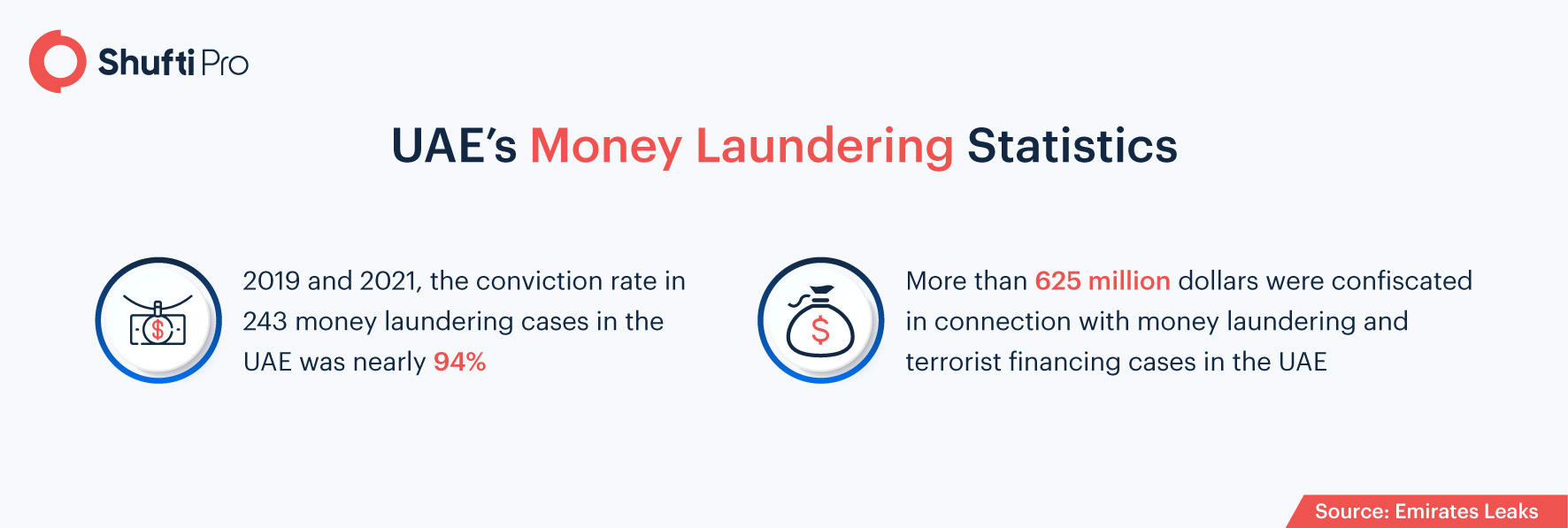Rise of Money Laundering in UAE – How Financial Institutions Can Comply with New Regulations

The UAE certainly earned its spot in the top 10 global financial centers with unprecedented growth and development in the financial sector. The prominent financial center in the Middle East is home to numerous international businesses and a dedicated economic zone known as the Dubai International Financial Centre (DIFC).
Apart from the country’s overall economy, banks and financial institutions also benefit from the high concentration of money coming from foreign sources. However, this influx of big money makes the UAE, in particular the city of Dubai, increasingly susceptible to financial crime.
Financial Crimes – A Stain on UAE’s Reputation
Back in 2019, the UAE was labeled as “money laundering paradise” by the leading anti-corruption organization Transparency International. Despite continuous efforts to ramp up its defense mechanism against money laundering, the country is still targeted by those looking to legitimize their black money. As a result, the UAE risks being added to the Financial Action Task Force (FATF)’s “grey-list”. Corrupt politicians and wealthy businessmen see UAE as one of the hotspots to invest large sums on purchases gold, yachts, and real estate. In April 2020, the FATF issued a warning to the UAE in light of the prevalent cases of money laundering and said that it needs to collaborate with international regulators to improve its AML compliance measures.
Apart from the high price-tags of luxury items, the rapid increase in the use of digital financial services after the Covid pandemic has also become the reason for financial crime. Although the digital-first approach suits both the customers in terms of convenience and the service providers, new opportunities are also created for fraudulent activities. That being said, the country is seen making efforts to bring about new regulations to prevent financial crimes by monitoring customers’ transactions through the use of automated KYC (Know Your Customer) and AML Screening solutions.
Authorities Stepping Up Against Illicit Crimes
As the provision of digital financial services evolves, there is an increasing need for foolproof security systems that enable financial institutions to meet international compliance regulations. In December 2021, UAE authorities including the Financial Intelligence Unit (FIU) and the Ministry of Community Development initiated efforts to cooperate with international authorities to prevent the risks of money laundering and terrorist financing in non-profit organizations such as charities.
Suggested read: UAE Authorities to Coordinate Efforts Against ML/TF Among NPOs
In November 2020, the Ministry of Economy established an anti-money laundering department, while a special court was established in Abu Dhabi for the sole purpose of preventing money laundering and tax evasion. At the end of last year, the UAE Central Bank fined an exchange house Dh352k for shortcomings in its AML compliance regime. The banking regulator imposed the fine in accordance with Article 14 of the Federal Decree Law No 20 of 2018 on anti-money laundering (AML), combating the financing of terrorism (CFT), and the financing of illegal organizations.
In a statement on Monday, the Central Bank said, “CBUAE will continue to work closely with all financial institutions in the UAE to achieve and maintain high levels of AML/CFT compliance and will continue to impose further administrative and/or financial sanctions, according to the law, in cases of non-compliance.”
Suggested read: UAE Central Bank Imposes Dh352k Fine on Currency Exchange
When it comes to making progress in the Middle East, the UAE is definitely far up ahead in terms of technology, economy, and regulations. The country has also adopted a unified system for national identity. Furthermore, the DIFC has developed its own regulatory regime to address and effectively eliminate the threats of financial crimes. The regulatory regime is supervised by the Dubai Financial Services Authority (DFSA), which is specifically formulated to address money laundering and terrorism financing in the special economic zone. The DFSA also urges the financial institutions in Dubai to take countermeasures against money laundering by complying with its regulations.
UAE’s Regulations for the Financial Sector
Speaking of regulations, the UAE has quite a lot of them. The UAE Central Bank, the Securities and Commodities Authority, the Dubai Financial Services Authority (DFSA) of the Dubai International Financial Centre (DIFC), and the Financial Services Regulatory Authority (FSRA) of Abu Dhabi Global Market (ADGM) have all jointly issued guidelines for the adoption of technology that empowers financial institutions with tools to counter illicit crimes.
All banks and financial institutions that are operating in the UAE and are licensed under the UAE law are obliged to follow these regulations. The rules also include the use of digital identity verification for fraud prevention, which takes the UAE a step ahead of other major financial centers. The use of Video KYC as well as biometric facial recognition for identity verification will enable financial institutions to seamlessly filter out the bad actors from their system. The regulatory bodies also permit the use of NFC verification for verifying identities using the national ID card in a one-tap mechanism.

Aside from the technologically advanced measures for verifying identities at the onboarding stage, the regulations also cover anti-money laundering requirements such as AML Screening. The primary law that governs financial institutions in the UAE is the “Federal Decree-Law No. (20) of 2018 On Anti-Money Laundering and Combating the Financing of Terrorism and Financing of Illegal Organisations”, and is designed while considering the guidelines of the EU’s Anti-Money Laundering Directives and the FATF’s Recommendations.
Global AML Regulations
The EU’s AMLD4, AMLD5, and AMLD6 have undergone revision throughout recent years in order to improve the regulations in response to increasing financial crimes. Although the UAE’s AML system was designed much later than as compared to the EU anti-money laundering directives, they do include the majority of improved guidelines in the AMLDs, such as the the requirement of carrying out enhanced due diligence and verifying politically exposed persons (PEPs) as well as global sanction lists. The requirement for enhanced due diligence is mentioned in the AML-CFT Decision 4.2(b), 7.2, 15, 22, 25.
Also, based on the FATF Recommendations, the DFSA has required financial institutions within the DIFC to adopt a risk-based approach to counter money laundering. The devised AML/CFT compliance program is supposed to include customer due diligence for verifying the clients’ identity, background, and nature of work. For customers who are deemed to be high-risk entities, the process of enhanced due diligence must be deployed. Moreover, banks and financial institutions are also required to adopt transaction monitoring systems to get overight on account activity and transactions of customers to analyze risk patterns. Transactions exceeding a fixed threshold amount or payments coming from high-risk jurisdictions are considered red flags.
What Shufti Offers
The UAE is a financial hub with several internal free trade zones that provide the perfect hiding place for money launderers. Although the country is striving to initiate crackdowns against money laundering and tightening regulations, there are still numerous cases of financial crime that make it to the headlines.
Shufti’s robust AML Screening solution can empower UAE’s financial institutions to run effective background checks against 1700+ global watchlists with a market-leading accuracy of 98.67%.
Want to learn more about our AI-driven AML Screening solution for your business?

 Explore Now
Explore Now













